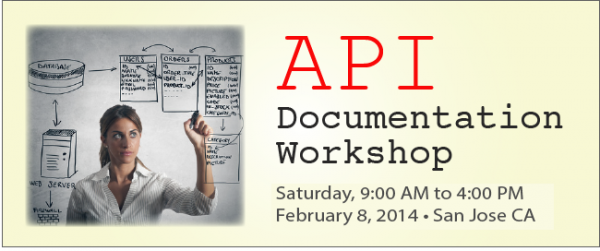Upcoming API Workshop in San Jose on Feb 8, 2014
January 25, 2014 Update: The API Workshop is totally full now. However, we may repeat it in the summer.
Since moving to California, I've noticed there's a high demand for technical writer jobs involving API documentation, but there's not much in the way of instruction, resources, or other events that provide training with API documentation.
When I mentioned this to some local STC chapter leaders, they encouraged me to find an API expert and organize a workshop around API documentation. So I did. Here are the details.
API Workshop
Time: 9:00 AM to 4:00 PM
Date: Saturday, February 8, 2014
Location: Nimble Storage, Inc., 211 River Oaks Parkway, San Jose CA 95134
Cost: $100 STC members, $125 non-members (includes lunch)
Sponsor: STC Silicon Valley Chapter
Instructor: Jim Bisso
Please bring your laptop
Workshop Description
One of the hottest markets for technical communication jobs in Silicon Valley is API documentation. Yet few tech comm books, conference sessions, or workshops tend to focus on developing API documentation skills.
One reason is that API documentation is typically seen as the developer's domain, requiring a programmer's level of knowledge to navigate. In reality, technical writers can create helpful API documentation without being full-fledged programmers.
With a working knowledge of the code you're documenting, you can create API documentation that includes descriptions of objects, methods, arguments, as well as code samples and other details to help developers understand how to successfully use an API.
In this all-day workshop, Jim Bisso, a veteran of API documentation and author of Documenting APIs—Writing Developer Documentation for Java APIs and SDKs, will cover a variety of topics to help technical writers get started with API documentation. Specifically, the workshop will include the following:
What is an API?
- The constituent elements of an API
- Programming languages
- Objects, operations, and properties
What is API documentation?
- Doing it by hand
- Using tools to generate API docs
What are the different kinds of API documentation (or developer documentation)?
- API references vs programmer's guides
- Tutorials and sample code
- Best practices, design patterns, anti-patterns, and idioms
Writing good API documentation
- How much programming do I need?
- How to get information from developers (and other SMEs, support, QA, etc)
Additional topics
- Organization (and style) of API docs
- Illustrations: UML and other diagrams
- Demo and hands on examples
There will also be a broad overview of tools and languages, and some specific sample API docs.
About the instructor
 Jim Bisso has 25 years of experience writing API documentation for such companies as Oracle, Sun Microsystems, Inprise, and Taligent. He has also taught computer science and documenting APIs at UC Berkeley Extension, Golden Gate University, Mills College, and the University of San Francisco. Jim has also been a corporate trainer for Oracle University and Bitzone LLC.
Jim Bisso has 25 years of experience writing API documentation for such companies as Oracle, Sun Microsystems, Inprise, and Taligent. He has also taught computer science and documenting APIs at UC Berkeley Extension, Golden Gate University, Mills College, and the University of San Francisco. Jim has also been a corporate trainer for Oracle University and Bitzone LLC.
For more details about the location and how to sign up, see the API Class description on the STC Silicon Valley STC chapter site.
About Tom Johnson

I'm an API technical writer based in the Seattle area. On this blog, I write about topics related to technical writing and communication — such as software documentation, API documentation, AI, information architecture, content strategy, writing processes, plain language, tech comm careers, and more. Check out my API documentation course if you're looking for more info about documenting APIs. Or see my posts on AI and AI course section for more on the latest in AI and tech comm.
If you're a technical writer and want to keep on top of the latest trends in the tech comm, be sure to subscribe to email updates below. You can also learn more about me or contact me. Finally, note that the opinions I express on my blog are my own points of view, not that of my employer.

